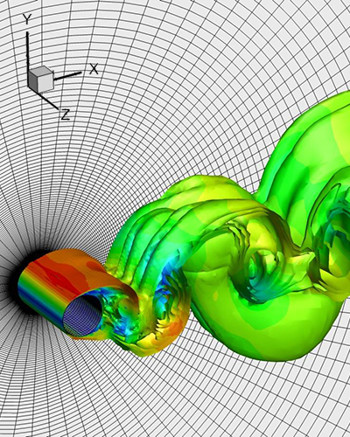Applied Science in Mechanical Engineering
Tutor: prof. Ing. Zbyněk Šika, Ph.D.
|
Specializations |
|---|
|
Applied Mechanics |
|
Biomechanics |
|
Mathematical Modeling in Engineering |
|
Mechatronics |
 The aim of the study program Applied Sciences in Mechanical Engineering is to prepare top experts for research, development
and practice, applicable in practically all fields of engineering. Graduates are able to apply both basic and more complex
mathematical and physical models and procedures for solving tasks in technical practice. The study program has four specializations:
The aim of the study program Applied Sciences in Mechanical Engineering is to prepare top experts for research, development
and practice, applicable in practically all fields of engineering. Graduates are able to apply both basic and more complex
mathematical and physical models and procedures for solving tasks in technical practice. The study program has four specializations:
- Applied mechanics
- Biomechanics
- Mathematical Modeling in Engineering
- Mechatronics
A less important part of the study program are common core subjects, the aim of which is for the student to acquire profiling theoretical knowledge and knowledge necessary for engineering activities and to qualify in both theoretical, interdisciplinary and applied disciplines. Specializations allow students to master a narrower field in detail according to their interest and professional preferences. The aim of the specializations is to teach students the methods of engineering and scientific research work in a narrower disciplinary and interdisciplinary context, to pass on specific knowledge from their fields and, last but not least, to develop the ability of students to work independently in solving complex problems. For this purpose, the compulsory subjects of specializations are used, which in some cases are shared by several specializations. In project-oriented teaching and as a follow-up to other mandatory subjects of individual specializations, future graduates of the field learn procedures and methods based on both the design and solution of mathematical models, as well as the design and implementation of experiments associated with specific physical-mechanical, biomechanical and mechatronic systems.
The degree program requires students to creatively apply knowledge of higher mathematics, numerical mathematics and programming, theoretical mechanics, theory of elasticity, fluid mechanics and thermomechanics and other disciplines to various areas of engineering.
GRADUATE PROFILE
![[zamereni_studia/biomechanika/bio_03.jpg]](https://fs.cvut.cz/content/images/zamereni_studia/biomechanika/bio_03.jpg) The profile of the graduate corresponds to the focus of the program on the preparation of highly qualified experts in research,
development and the most demanding disciplines of technical practice. Even if the study program is partially implemented in
the chosen specialization (Applied Mechanics, Biomechanics, Mathematical Modeling in Engineering, Mechatronics) the common
basis guarantees such universality of the graduate's profile that it enables application not only in practically all engineering
fields, but also in related interdisciplinary disciplines. After gaining practical experience, graduates will be able to solve
the most demanding technical problems as well as lead and manage engineering practice projects. Emphasis is placed on the
ability to use simulation mathematical, mechanical and mechatronic models of real systems, including conducting experiments
to identify their parameters and verify them. Graduates of the field master theoretical and applied mathematics and numerical
methods of solving physical equations, methods of conducting experiments and have practical experience in laboratories, master
the mechanics of systems of bodies and continuum mechanics in the field of solid and liquid phases, have basic experience
with simulations of mechanical systems, including the design of numerical models.
The profile of the graduate corresponds to the focus of the program on the preparation of highly qualified experts in research,
development and the most demanding disciplines of technical practice. Even if the study program is partially implemented in
the chosen specialization (Applied Mechanics, Biomechanics, Mathematical Modeling in Engineering, Mechatronics) the common
basis guarantees such universality of the graduate's profile that it enables application not only in practically all engineering
fields, but also in related interdisciplinary disciplines. After gaining practical experience, graduates will be able to solve
the most demanding technical problems as well as lead and manage engineering practice projects. Emphasis is placed on the
ability to use simulation mathematical, mechanical and mechatronic models of real systems, including conducting experiments
to identify their parameters and verify them. Graduates of the field master theoretical and applied mathematics and numerical
methods of solving physical equations, methods of conducting experiments and have practical experience in laboratories, master
the mechanics of systems of bodies and continuum mechanics in the field of solid and liquid phases, have basic experience
with simulations of mechanical systems, including the design of numerical models.
In the individual specializations, graduates will acquire additional specific knowledge and skills in the areas of analysis of synthesis and design of mechanisms, analysis of body tension, demanding stationary and non-stationary internal and external tasks in the mechanics of incompressible and compressible fluids, theory of thermal calculations of machines and devices, limit states of failure of metal and composite structures, assessment of service life and reliability of machinery, optimal dimensioning of machine components (Applied Mechanics), control of mechanical systems including proactive influencing of their properties and use of artificial intelligence (Mechatronics), theory of ordinary and partial differential equations and their application in solving mechanics tasks with regard to numerical solutions, including algorithmizing and programming of custom applications (Mathematical Modeling in Engineering). In the field of Biomechanics, following the basic knowledge of anatomy and physiology, they will learn about the biomechanics of hard and soft tissues as well as nanobiomechanics and can be partners in solving medical problems related to biomechanics.
![[design/2014/cvut-logo-en-white.png]](https://fs.cvut.cz/content/images/design/2014/cvut-logo-en-white.png)
![[design/2014/cvut-logo-en-print.jpg]](https://fs.cvut.cz/content/images/design/2014/cvut-logo-en-print.jpg)